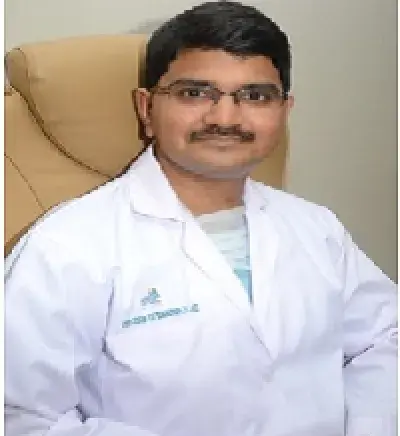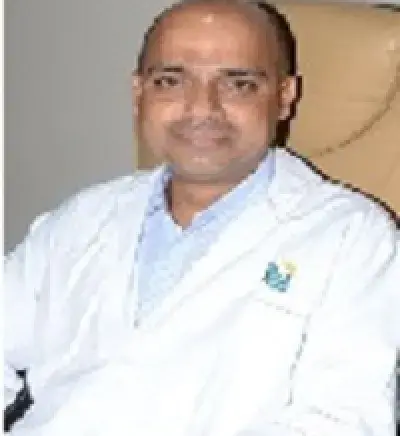Could not find what you are looking for?
Best Doctors for CABG in Bhubaneswar
Dr Sthiti Das
18+ Years ExperienceSelect Date
-
Loading available days...
Available Slots:
Dr. Sthiti Das is a highly qualified and experienced Radiation Specialist Oncologist based in Bhubaneswar, Odisha. With 18 years of dedicated experience in the field of oncology, Dr. Das has earned a...
Dr P C Rath
36+ Years ExperienceSelect Date
-
Loading available days...
Available Slots:
Dr P C Rath is a distinguished Cardiologist based at Apollo Hospitals Bhubaneshwar. With an impressive 36 years of experience in the medical field, he has dedicated his career to providing exceptional...
Dr Prasant Kumar Sahoo
37+ Years ExperienceSelect Date
-
Loading available days...
Available Slots:
Dr. Prasant Kumar Sahoo is a highly esteemed Cardiologist with an extensive 37 years of experience in the field of cardiovascular health. Based in Bhubaneswar, Odisha, he holds an impressive set of...
Dr Debashish Nayak
12+ Years ExperienceSelect Date
-
Loading available days...
Available Slots:
Dr. Debashish Nayak is a distinguished Vascular Surgeon with over 12 years of experience in the field. Based in Bhubaneswar, Odisha, he brings a wealth of knowledge and expertise in vascular surgery...
Dr Debabrata Dash
10+ Years ExperienceSelect Date
-
Loading available days...
Available Slots:
Dr Debabrata Dash is a distinguished Anaesthesiology based at Apollo Hospitals Bhubaneshwar. With an impressive 10 years of experience in the medical field, he has dedicated his career to providing...
Dr Mami Parija
18+ Years ExperienceSelect Date
-
Loading available days...
Available Slots:
Dr. Mami Parija is a highly skilled Pain Management Specialist with over 18 years of experience in the field. Based in Bhubaneswar, Odisha, she combines her deep knowledge in anesthesiology with an...
Dr Samarjit Bisoyi
10+ Years ExperienceSelect Date
-
Loading available days...
Available Slots:
Dr Samarjit Bisoyi is a distinguished Anaesthesiology based at Apollo Hospitals Bhubaneshwar. With an impressive 10 years of experience in the medical field, he has dedicated his career to providing...
Dr Saumitra Satpathy
8+ Years ExperienceSelect Date
-
Loading available days...
Available Slots:
Dr Saumitra Satpathy is a distinguished Anaesthesiology based at Apollo Hospitals Bhubaneshwar. With an impressive 8 years of experience in the medical field, he has dedicated his career to providing...
Dr Nihar Ranjan Dash
13+ Years ExperienceSelect Date
-
Loading available days...
Available Slots:
Dr. Nihar Dash is a highly skilled General Physician and Internal Medicine Specialist with over 13 years of experience in the medical field. Based in Bhubaneswar, Odisha, he provides comprehensive...
Dr Brajaraj Das
25+ Years ExperienceSelect Date
-
Loading available days...
Available Slots:
Dr. Brajaraj Das is a highly experienced Cardiologist with over 25 years dedicated to the field of cardiology. Based in Bhubaneswar, Odisha, he is an esteemed member of the Apollo healthcare network...
Coronary artery bypass graft surgery (CABG) is a surgical procedure bypassing an obstructed artery using a healthy blood vessel from elsewhere in the body. It is recommended for patients suffering from coronary artery disease, characterised by the narrowing of the arteries due to a build-up of fatty matter or any condition restricting the flow of oxygen-rich blood to the heart muscle, leading to discomfort, angina, and in severe cases, a heart attack.
Bhubaneswar is home to highly experienced cardiac doctors and some of the best heart bypass surgery CABG doctors in India.
Conditions for which Coronary Artery Bypass Graft Surgery is Performed:
The conditions that may necessitate a bypass surgery include:
1. Chronic Stable Angina: Stable Angina is characterized by chest pain on physical exertion or emotional stress. CABG is recommended when angina symptoms cannot be controlled with medication.
2. Heart Attack: In cases where a heart attack has caused significant damage to the heart muscle, CABG can restore blood supply and prevent further complications.
3. Coronary Artery Disease: This condition narrows or blocks coronary arteries due to plaque formation. CABG offers an improved survival rate for patients suffering from this severe coronary disease or patients with multiple blocked arteries.
4. Failed Percutaneous Coronary Intervention: If angioplasty or stent placement fails to restore blood flow, CABG may be necessary.
5. Diabetes with Coronary Heart Disease: Diabetic patients with coronary heart disease may require CABG surgery for optimal revascularization and improved long-term outcomes.
How is CABG Conducted at Apollo Hospitals in Bhubaneswar?
At Apollo Hospitals in Bhubaneswar, coronary artery bypass doctors perform CABG using state-of-the-art technology and techniques:
1. Preparation and Anaesthesia: Patients undergo thorough preoperative evaluation and are prepared for surgery. General anaesthesia is administered which renders them unconscious and pain-free during the surgery
2. Incision: Surgeons make a precise incision in the chest, exposing the heart.
3. Grafting: Utilizing blood vessels from the leg, chest, or wrist, grafts are meticulously prepared and attached to the blocked coronary artery.
4. Bypass: The graft is connected above and below the blockage, establishing an alternate pathway for blood circulation.
5. Closure: The chest incision is carefully closed, ensuring proper wound healing, and patients are transferred to the recovery area for postoperative monitoring.
How to Choose the Best Specialist for CABG in Bhubaneswar?
Bhubaneswar is home to some of the best CABG specialists in India. These heart bypass doctors have vast experience which combined with their patient-centred approach ensures you receive the highest level of care.
Why Plan Your CABG with Apollo Hospitals?
At Apollo Hospitals Bhubaneswar, we harness cutting-edge technology to ensure you receive exceptional care during your CABG procedure. Minimally Invasive CABG uses smaller incisions, often incorporating off-pump technique, for reduced pain and faster recovery. Robot-Assisted CABG utilises precise robotic control, allowing for smaller incisions and potentially shorter hospital stays.
Our team of coronary artery disease doctors are dedicated to delivering comprehensive care and support from diagnosis through recovery. Apollo Hospitals use modern techniques such as off-pump CABG, which doesn't use heart-lung bypass while a patient is being operated on.










